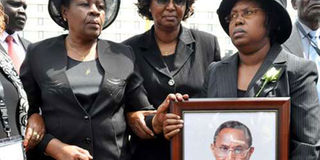The day Saitoti felt betrayed by Moi at Kasarani

Mrs Margret Saitoti, the widow of Internal Security Minister George Saitoti, and close relatives attend his funeral mass at the Holy family Basilica on June 15, 2012. By working outside the Rift Valley elite, Prof Saitoti naively thought he could marshal support and that, as the vice-president, his appointment to a senior party position was a given. PHOTO | SALATON NJAU | NATION MEDIA GROUP
What you need to know:
- He walked over to Mr Moi and, according to multiple sources, complained loudly about it. It was the first time that many of his friends had seen him complain bitterly.
- Four vice-president positions had been created and their occupants picked: Mr Musalia Mudavadi for Western, Mr Katana Ngala (Coast), Mr Uhuru Kenyatta (Central) and Mr Kalonzo Musyoka (Eastern).
Until the wee hours of March 18, 2002, Prof George Saitoti had played his political cards well as his friends mapped out his political career and prepared for the merger between the Raila Odinga-led National Development Party (NDP) and the ruling party, Kanu.
As he drove to the Kasarani Stadium from his Lavington home, in Nairobi, Prof Saitoti was confident he would retain the Kanu’s vice-president post.
Mr Odinga, too, believed the merger would finally allow him to ascend to the presidency.
It was the end of a blistering campaign within Kanu that had seen candidates traverse the provinces wooing delegates.
By working outside the Rift Valley elite, Prof Saitoti naively thought he could marshal support and that, as the vice-president, his appointment to a senior party position was a given.
“We had worked very hard up to that morning,” Mr Alex ole Magelo, one of Prof Saitoti’s campaign managers, recalls. “Saitoti was confident he would get a prime seat.”
What Prof Saitoti did not know, however, was that his fall had been choreographed at State House by some key Rift Valley elite and erstwhile associates.
Another person who was to fall with him was then Kanu Secretary-General Joseph Kamotho, whose position was to be taken by Mr Odinga. Neither got wind of what lay ahead.
Four vice-president positions had been created and their occupants picked: Mr Musalia Mudavadi for Western, Mr Katana Ngala (Coast), Mr Uhuru Kenyatta (Central) and Mr Kalonzo Musyoka (Eastern).
Secretary-General seat had been reserved for Mr Odinga while President Daniel arap Moi would be the party president.
It incorporated all the provinces. What Prof Saitoti did not know was that Moi was looking elsewhere for his successor and was secretly campaigning for political novice Kenyatta, whom he had appointed Kenya Tourism Board chairman shortly after he lost the race for the Gatundu South parliamentary seat.
In October 2001, Moi had forced Mark Too to step down as Nominated MP in favour of Uhuru, whom in November 2001 he appointed to the Cabinet.
It was a few months to the Kanu presidential nominations and Raila thought this would be his crowning moment if he combined the Kanu block of votes with the ones in Nyanza — a dangerous gamble.
Pundits say the problem with Saitoti was that he had very few confidantes. That day, he was horrified to find out that his name was not in the line-up.
He walked over to Mr Moi and, according to multiple sources, complained loudly about it. It was the first time that many of his friends had seen him complain bitterly.
FAMOUS SPEECH
But Moi dismissed him with: “Kimya (shut up!) Professor, if your name is not on the list, it is not there.”
That evening, he met a small group of confidants. As usual, he ordered cognac and his trusted bodyguard Surtan did the mixing. He downed a few glasses.
“I feel pain. I have been betrayed,” he had previously told Magelo, a close associate, as they left Kasarani.
Having been the longest-serving Kenyan VP, he had been secretly gunning for the presidency. But he decided to play safe politics.
“He was bitter but did not keep a grudge,” Magelo, the Nairobi County Assembly Speaker, recollects.
When he realised his dreams had been shattered, Saitoti took to the microphone at the Kasarani and made his now most famous political speech: “I know there are many of you who wanted me to contest, is that not so?” he asked the delegates.
“There come (sic) a time when the nation is more important than an individual…but one day I will be proved right.”





